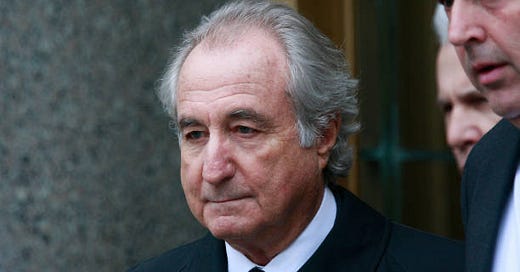Bernie Madoff’s Imagination, And Ours
Bernie Madoff, architect of the largest Ponzi scheme in history, died today in a federal prison hospital, eleven years into his 150-year sentence. He was 82. Madoff swindled nearly 20 billion dollars from thousands of individual investors and many charities. I share below the story I wrote for CNN.com on February 27, 2009, two months after his arrest, entitled How Elie Wiesel Would Punish Bernie Madoff.
If anyone should know better, if anyone should have his guard up, you’d think it would be Elie Wiesel. “I should have learned,” he said, “that a human being is capable of anything.”
Elie Wiesel, Holocaust survivor, does know what a human being is capable of. He put the nature of good and evil into words in ways others cannot, and won the Nobel Prize for it. “A messenger to mankind” is what the Nobel committee called him.
And yet, when, many years ago, a wealthy friend introduced him to Bernard Madoff, Wiesel’s imagination failed him. “I have seen in my lifetime,” the Auschwitz survivor told a Conde Nast roundtable on Madoff, “that the problem is when the imagination of the criminal precedes that of the innocent.” Even Elie Wiesel could not recognize what he considers a criminal imagination right in front of his face.
Wiesel says he lost all of his personal savings to Madoff’s alleged Ponzi scheme: everything he put away from his more than 50 books and countless lectures, and $15.2 million of his charitable foundation’s endowment. Among other things, that foundation provided care for one thousand Ethiopian children in Israel.
How it Happened
Before we get to Wiesel’s recommended punishment of Madoff, here’s how the survivor and his wife got sucked into Madoff’s orbit:
We had friends who were very close friends of Madoff, and years ago a friend just came to us and he said, ‘look …. you work so hard, what are you doing with your money?’ And, we said, ‘look, we don’t know, shares here and there.’ … Our friend was a friend of Madoff; it was 50 years ago or so that our friend gave him seed money. And that’s how we came to him. We met him twice in our entire existence. He made a very good impression. We had dinner together…. I know that we checked the people who had business with him, and they were among the best minds of Wall Street – the geniuses in the finance field. I am not a genius in finances; I teach philosophy and literature. I don’t know anything about the economy or financing…. And so it happened.
Putting aside the question that the court system will decide in the Madoff case, what does Wiesel believe? He says he believes Madoff was probably always a crook. “Great events simply make the good better, and the bad worse.”
How Wiesel Would Punish Madoff
Elie Wiesel, the man the Nobel committee called a messenger to mankind, says this punishment is just for Madoff;
I would like him to be in a solitary cell with a screen, and on that screen, for at least five years of his life, every day and every night there should be pictures of his victims, one after the other after the other, always saying ‘look, look what you have done to this poor lady, look what you have done to this child, look what you have done.’ But nothing else – he should not be able to avoid those faces, for years to come. This is only a minimum punishment.
You could call that the imagination of the victim.
The Power of Imagination: Take Two
I’ve shared Elie Wiesel’s observations about the criminal imagination and how it often outpaces the honest mind. But, as Wiesel said the other day, “I do not want to stop here.” Remember the 15 million dollars Wiesel says his foundation lost to Madoff?
You cannot imagine [there’s that word again] the response of this tragedy to us, of the people to us….Unsolicited, hundreds of people that we have never known sent us money through the internet: $5, $18 (the number that symbolizes life in Judaism), $100, even $1,000 …. it’s just incredible the generosity of people who want to help.
It reminded Wiesel, in a way, of the aftermath of 9/11.
… people on the street, strangers, would speak to one another, would share the pain … they stood in line to give blood … And so here again, the generosity, it cannot compensate, but it shows again, a human being is capable of both very great, good things, and very horrible things.
In other words, life is a battle of competing imaginations.
Postscript
There is one man whose imagination did catch up with Bernie Madoff’s. His name is Harry Markopolos. He blew the whistle on Madoff in 2001. It would be seven years before anyone listened. I wrote about this for CNN.com in a story entitled Where Have You Been, Harry Markopolos?
Coming next week on the Wavemaker Conversations newsletter, my conversation with Timothy Snyder, author of On Tyranny: Twenty Lessons From The Twentieth Century — imagination powered by history.
If you find these newsletters informative, entertaining, and even inspiring, I hope you’ll subscribe. It takes just a few seconds to sign up.





